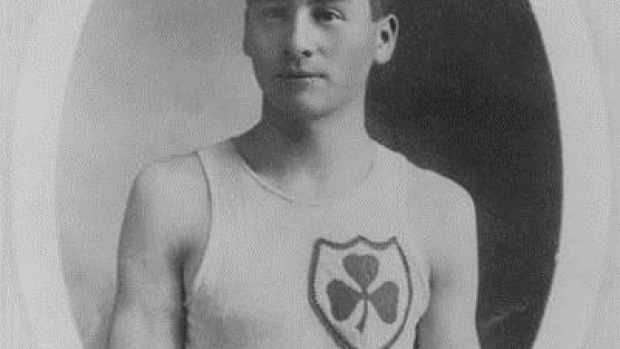Nov 9, 2016
Alex Decoteau: Skilled distance runner was devoted to his country
With Remembrance Day approaching, TSN’s Bob Weeks travelled to Belgium to visit the battlefields and cemeteries of the First World War to profile some of Canada’s top athletes of the day who made the ultimate sacrifice more than a century ago.
By Bob Weeks

ZONNEBEKE, Belgium - At the top of a gentle rise just outside the town of Zonnebeke, overlooking the pastoral farmers’ fields that spill out over the Belgian countryside, is the Passchendaele British New Cemetery, the final resting place for many Commonwealth soldiers, including a large number of Canadians.
Walk down to the lower tier, past a few rows, go in three graves and there sits the marker bearing the name A. Decoteau. A small rose bush sits just to the right of it, the blooms gone in the November winds. A small wooden cross carrying a red paper poppy sits in the ground in front of it.
Like most of the other gravestones here, it provides the basics of information: He was a private in the 49th Battalion and he died on the 30th of October, 1917, at the age of 28.
For almost a century, he has rested in this spot along with his comrades who were killed in the Second Battle of Passchendaele. But that doesn’t even begin to reveal the story of Alex Decoteau, a man who was one of Canada’s greatest runners of his day, an Olympian, a Cree and a trailblazing aboriginal.
Born in 1887 on the Red Pheasant Reserve in Saskatchewan, Decoteau was a natural athlete who loved to run, winning races as a teenager. In 1909, he moved to Edmonton to live with his sister and her husband. He began working for his brother-in-law, a former Mountie, in a machine shop. In 1911, he joined the Edmonton Police Force, becoming Canada’s first aboriginal police officer. A few years later, he was the first motorcycle cop in Canada, patrolling the west end of the city from his bike.
The love he had for his job was surpassed only by his enjoyment of running. He’d started running back in school in Saskatchewan and had never looked back. In Edmonton, he won race after race and began to compete on the national level, where his success continued.
On Canada Day (then Dominion Day) in 1910, he ran in the Alberta provincial championship, entering four separate races – the half-mile, mile, two-mile and five-mile. To no one’s surprise, he won all four.
A year later, in Vancouver, Decoteau easily won the Canadian championships in the five-kilometre race, which qualified him to run in the 1912 Olympics in Stockholm, Sweden. He was the only Albertan on the team that year and many predicted he was a medal contender. That hope was buoyed when he came second in his semi-final heat. In the final, he was running well, sitting in third place on the last lap, however leg cramps took hold in the unusually warm temperatures and had to settle for fifth.
Still, he returned home to Edmonton to great acclaim, receiving a parade down Jasper Avenue.
In April 1916, Decoteau enlisted with the Canadian Forces and, after a stint with the 202nd Battalion (known as the Edmonton Sportsman’s Battalion) joined the 49th Battalion. He continued to run, entering military races in England, where his group was training. At a military sports day (common diversions for the soldiers at the time), Decoteau won a five-mile race and was presented with a gold pocket watch by King George V, who was in attendance.
A year later, in October, the 49th was sent into action on the Ypres Salient, in what became known as the Battle of Passchendaele, famous for the horrid conditions, that included knee-deep mud and constant rain. During one fierce part of the battle, Decoteau was shot by a sniper, falling to the ground immediately. In those days, it was not uncommon for the bodies of dead soldiers to be looted and at some point, the German killer reportedly took the pocket watch from Decoteau’s body.
So incensed were his comrades that they later in the battle managed to find the sniper, kill him and retrieve the watch. It was eventually sent home to his mother, a small testament to a son who gave his life in battle.
While his body rests in that cemetery beside those of his fellow soldiers, in 1985 his family and friends performed a special Cree ceremony that returned his spirit to Edmonton, the city where he made such an impact. Members of the Red Pheasant First Nation, Canadian Armed Forces and the Edmonton Police Force were all in attendance.
It may have been almost 100 years since Decoteau died, but his name and impact live on.
His skill as a runner and his devotion to his country were recognized with his induction into the Edmonton Sports Hall of Fame, the Saskatchewan Sports Hall of Fame, the Alberta Sports Hall of Fame and the Canadian Sports Hall of Fame.
As a fitting tribute, in 2001, the city of Edmonton started the Alex Decoteau run, focusing on students from the city’s inner city schools. It also named a street named after him – Decoteau Way – and next year, a century after he died, Decoteau Park will open in Edmonton.

